I snore. So I’m told. I wouldn’t know for sure because I’m unconscious when it happens. I’ve never recorded myself sleeping. I’ve never recorded myself in bed for any reason, believe it or not. There is a chance that everyone who has told me I snore is gaslighting me: partners, doctors, other comedians who’ve split hotel rooms and Airbnbs with me (one of whom woke me up by saying “Are you serious?” the second I started to fade). I’m guessing they’re not all lying. Especially not the sleep doctor who made me take an at-home sleep study this month because I admitted to having one teensy bad habit that could negatively affect my health and the health of others: I fall asleep while driving.
In fairness, I take long drives. Often on small amounts of sleep. Once, when I was ten minutes from my house, sober for at least a week, a police officer pulled me over for swerving on a suburban street outside of Cleveland at midnight.
“Where you coming from?” he said with a sigh as if my answer were a foregone conclusion.
I realized I had passed a long strip of bars in Lakewood two minutes back, and he had a working theory about my answer.
I replied meekly: “New York City.”
“Jesus,” he said, relaxing his shoulders. “OK, then.”
I told him my address and he said he’d drive in front of me until I got home.
Looking at the lights on the top of his squad car, and staring at my headlights reflecting off his white bumper, I felt like I was looking directly at the Sun. Still, even after the panic of being pulled over, I felt my eyelids droop.
Snoring is funny. It’s the stuff of Hanna-Babera cartoon character sleep as in “Honk shoo, mimimi…” It’s an involuntary bodily function that sounds a little gross, like burping or a loud, well-timed sneeze. Apparently, the way I do it is not funny at all. It sounds like I’m choking on my own tongue, like I’m being waterboarded by my own saliva. I know because a girlfriend in college wanted to prove to her friend how bad it sounded, and as an experiment, they both made me lie down on one of their twin beds while they worked on essays at their desks one evening. I was on my back, staring at the piece of thin green and beige fabric surrounded by Christmas lights on their wall, convinced I’d never fall asleep under these circumstances. Five minutes later, I awoke to the words “God, I thought you were joking!” I opened my eyes and saw both of them looking at each other with their eyes wide, the girlfriend pinching her lips together to say “I told you so” while the friend’s mouth hung open in awe. The girlfriend and I broke up a few weeks later, and snoring was not mentioned in our relationship exit interview, but I’ll never know for sure if it was the “constant need to be around your friends” or my sleep apnea.
Aside from these various legal, social, and health hazards, intense snoring and bad sleep don’t feel like a big deal. I know poor sleep affects your heart, weight, brain function, blood sugar, and your mood, but… other than that? How bad is it, really? Doctors have already said sitting is the new smoking, and if they try to tell me snoring is the new smoking, I’m going to have a new kind of fit that affects my breathing and heart rate. I refuse to believe that snoring is life-threatening. I don’t even buy that the sound is all that annoying for the listener who can’t fall asleep next to the snoring person. Then again, I’m always so tired by the time my head hits the pillow at night that hearing someone snore could never compete with my utter exhaustion. Aside from the first four hours in the morning after a cup of coffee, I’m always ready to sleep. Probably because of poor sleep and the caffeine crashes. No matter the circumstances, I’m ready to go back to bed. Once in college, I visited a friend at his school, and after a night of beer pong, I awoke to my friend’s throat catching, then the rapid thumps of his heels on the linoleum as he ran to throw up in the trash can near my bed. “Sorry. I think my phone buzzed and woke me up?” he said as if his phone ringing at night always inspired him to vomit. I gave him a thumbs up. We both went back to sleep immediately.
My wife and I have a pug, one of the few dog breeds that seem to snore while awake. He sleeps at night leaning hard against my left leg or sprawled out at the foot of the bed and is asleep within seconds of finding the spot he wants. He is loud. He makes little chirping sounds and shudders when he’s dreaming before letting out guttural rumbles from his throat all night. I find it soothing. It lulls me to sleep. How can one species’ snoring be relaxing while hearing it from our own is rage-inducing? Shouldn’t the sound inspire you to sleep? If you heard someone crying or vomiting, you yourself might feel like crying or vomiting. If someone yawns, you yawn. The second someone snores, you’re livid. How dare this person do something he can’t control? I bet he’s dreaming about eating something, the slob!
Maybe there’s an evolutionary necessity for being able to spot sleep apnea in the herd. Alarm bells ring when the eons of programming force you to move a caveman onto his side when he can’t breathe well because several cavemen who snored too egregiously performed poorly on the next day’s hunt or battle the next day. Or, as a cursory Google search assured me, the snoring caveman selfishly keeps other humans awake to watch for predators, much like, according to the book Why We Sleep, humans evolved genetic diversity that causes some people to be early birds and others to be night owls for the express purpose of have shorter chunks of time where the entire tribe is unconscious. Or maybe snoring is another mistake of evolution that disproves Intelligent Design once and for all, like the appendix no longer serving a purpose but still waiting inside you to explode or the fact that you can block your airway with a pretzel and die.
My point is I got a CPAP machine this month. It only took about two decades of being told that it sounds like I’m choking on nothing while I sleep to finally ask for help. A CPAP (Continuous Positive Airway Pressure) is a machine that pushes air through your nose to keep your throat open during sleep so you wake up feeling well-rested enough to spend most of your day worrying the CPAP machine is going to give you meningitis. Or kill you by pushing small pieces of foam into your lungs like the recalled Philips machine did to 561 people last year. If those scenarios don’t kill you, the embarrassment of needing to wear a helmet with a hose on the front to go to bed will.
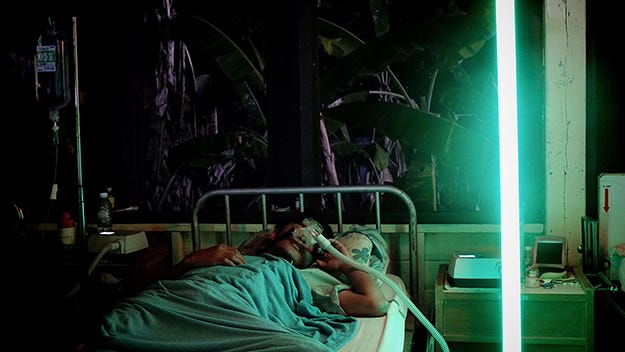
I’ve used the machine for three weeks and all I’ve noticed is that I’m more fatigued, and have a sore throat and headache most days. So I’m getting better sleep, but now I feel like I have a cold all the time. Instead of my wife hearing me snore, she now has to deal with a tube that blows cold air in her direction whenever I turn toward her in the night. Never mind the fact that now she has to hear her husband complain all day that his sleep machine is making him feel worse, not better. At least my apnea is gone! Another win for modern medicine.
The only unqualified good is that I remember all my dreams when I wake up in the morning…
I hate most movies that overtly tackle dreams. Like movies about high school, nothing I see feels like something I myself have experienced. No dream in a TV show or movie has felt (ironically) real. Richard Linklater’s Waking Life (2001), a rambling semi-animated movie about lucid dreaming is (forgive me) a snoozefest. Vanilla Sky (2001) is boring. Donnie Darko (spoilers) never did anything for me. Even old pretentious art films about the dreamworld like Orphée (1950) are not for me. The biggest culprit in boring dream cinema is Inception (2010), a Christopher Nolan heist film that feels less like a dream and more like a noir version of The Matrix (1999), complete with people “plugged into” the fantasy world while things a level above them in the real world affect their dream state. I lost friends complaining about this movie at the time of its release, and I fear losing readers as I type this now. I love action/heist movies! I love Mission Impossible and Ocean’s Eleven and Rififi. It’s weird, though, that Nolan has made several films that feel more like dreams than his dream movie.
“Though there is a lot to see in “Inception,” there is nothing that counts as genuine vision. Mr. Nolan’s idea of the mind is too literal, too logical, too rule-bound to allow the full measure of madness — the risk of real confusion, of delirium, of ineffable ambiguity — that this subject requires. The unconscious, as Freud (and Hitchcock, and a lot of other great filmmakers) knew, is a supremely unruly place, a maze of inadmissible desires, scrambled secrets, jokes and fears. If Mr. Nolan can’t quite reach this place, that may be because his access is blocked by the very medium he deploys with such skill.
And the limitations of “Inception” may suggest the limits not only of this very talented director but also of his chosen art form at this moment in its history. Our dreams feed the movies. The movies feed our dreams. But somehow, our imaginations are still hungry.” -AO Scott on Inception
Nolan’s Tenet, by its very paradoxical nature and inability to be dissected by any sane person, lends itself to more dreamlike imagery than anything in his movie about dreams. The airport scene where everyone runs backward, the impossible physics of the car chase in reverse, the oxygen masks. All of that was more dreamlike than his earlier film. Movies already feel like dreams. They’re audiovisual spectacles you passively watch in a dark room that make you feel things you don’t necessarily want to feel.
The major issue I have with “dream cinema” is that there are a few movies that got it right, and they happen to be movies that everyone is forced to watch in film school. Trying to recreate the magic of these films requires reflection and honesty about how dreams feel more than sheer technical skill. Those movies are Maya Deren’s Meshes of the Afternoon, Fellini’s 8 1/2, and most of David Lynch’s work.
The first 3 minutes of 8 1/2:
Dream Scenario (2023) is a comedy/horror film starring Nicholas Cage who plays a boring tenured professor who suddenly starts appearing in everyone’s dreams. Unlike most comedy/horror movies, this one deals with the uncanny rather than the campy. None of the dreams are over-the-top, and a number are disturbing without needing any lurid imagery. What makes the movie funny is the tension between fantasy and reality, and how much of a dweeb Cage can be in the real world and in the dreams. The inciting incident has no cause, and the experience of watching a character deal with the consequences of the random event elicits the meta experience of watching a man live a nightmare in the “real world” scenes in the movie. Dream Scenario is also, if you can believe it, about fame, publicly shaming people, generation gaps, and maintaining a good marriage. I loved it.
I didn’t think many movies could capture how strange, silly, and scary a dream can be like the Winkie’s Diner scene in Mulholland Drive. Dream Scenario has the same subtle level of the scary and silly mixed together while also being a straightforward movie with an understandable plot.
The only other dreamlike movie I’ve enjoyed in the past isn’t explicitly about dreams at all. It’s about human memory. Eternal Sunshine of The Spotless Mind (2004).
The Cedar Lee Theatre is on the East side of Cleveland and has been screening movies since 1925. Can you imagine being bored in Cleveland in the 20s and having a choice between eating your weight in pierogis, seeing an American League baseball team play, or seeing a Chaplin movie? I can because I squeezed that all into a single day once, thanks in part to the Cedar Lee Theatre.
I took my friends to see anything that played there. I saw Lost in Translation with a girl who hated it while I sat with tears running down my face, pretending afterward that I too was unaffected by Bill Murray’s inaudible goodbye. I saw the Wilco documentary there. On a school night no less! It was the first theater I ever went to that served beer and they were happy to crack a few Great Lakes Dortmunders for me when I was 16. The joy of Cleveland is that it’s a city that feels like a small town. I knew someone who knew someone’s older brother who worked the concession stand and hooked me up. Ice cream was free in my teens because we all knew everyone working the registers. Golf was free. Laser tag, free. The movie tickets and beer at the Cedar Lee? Also free. I miss Cleveland every day.
I went on a double date with my friend Nate and two girls we knew from a sister school. We saw Thirteen (2003), a movie about every awful thing a teen might do to herself in the early aughts. We stood outside the theater, the three of them seething that we all could have seen Bad Boys II that night or done anything besides watch a young Evan Rachel Wood cut herself.
The Cedar Lee is also where I saw Eternal Sunshine. The movie featured the best dream-like sequences in any movie I had seen up to that point. Characters rehash odd interactions from previous scenes but now some characters were faceless or speaking as if having a stroke. There’s a couples quarrel where cars are falling from the sky. There’s also an extremely melancholy opening sequence where Jim Carey’s character Joel ditches work to go to Montauk.
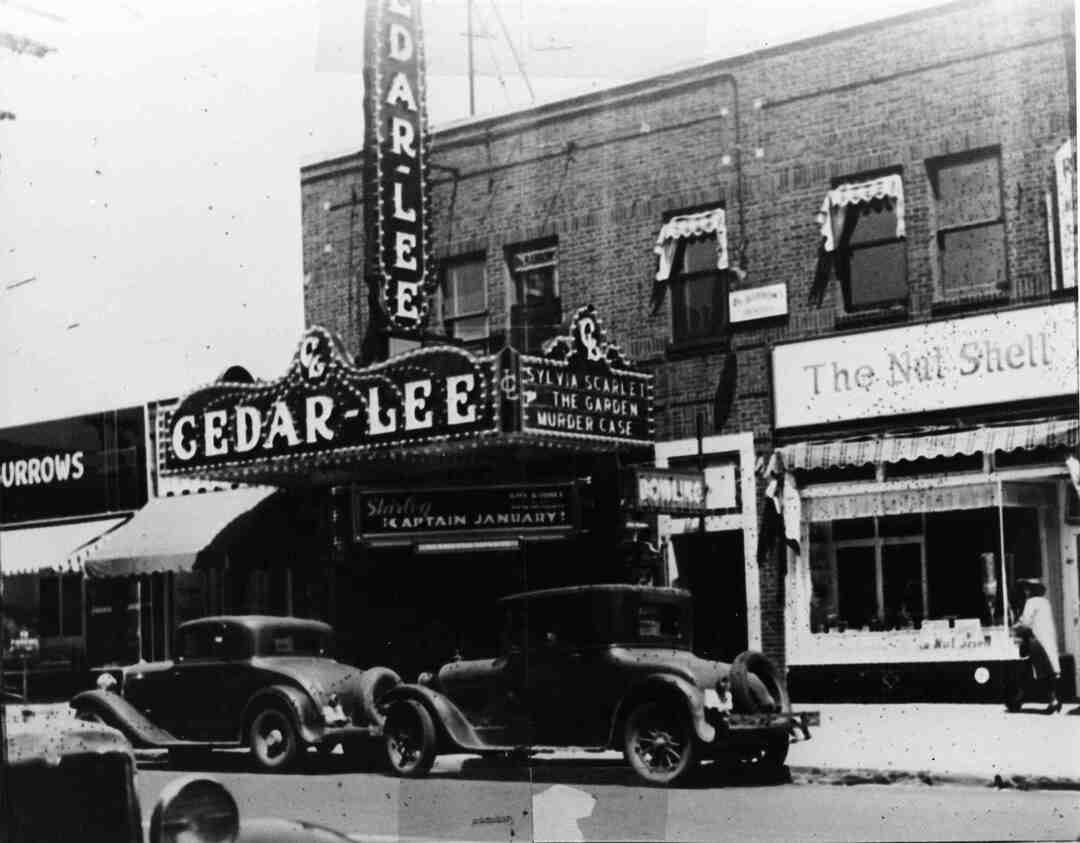
A friend recently told me a story about her mom’s good friend realizing he was gay during Brokeback Mountain. He rushed outside the theater and threw up, realizing at that moment his life had changed forever because of a film. I have never had a revelation that earth-shattering. I do, however, have a distinct memory of being in my favorite theater in 2004, a beer in my hand, watching Jim Carey dig in the sand on a beach in the middle of winter, and thinking: “Oh… I’m depressed.” I was a funny guy who also shared the same issues as the actor and the character when it came to relationships and various irks he couldn’t fix within himself. I didn’t feel morose or suicidal. It was like finishing the border pieces of a jigsaw puzzle. “Huh.” I thought. “I’ve been bummed out for a long time.”
I have a recurring nightmare where I'm standing in front of the open trunk of my car, looking at all my belongings packed up for a move. I’m usually in an empty parking lot, rather than on the street of a city. Dream Me is always holding some final item that won’t fit, a stack of books or a comically large water bottle, and a friend appears next to me. Instead of helping me find a way to fit the last item into the overflowing trunk, he pats me on the back and says “Don’t worry, you’ll have plenty of time for comedy up there."
It is not explicit from any other imagery in the dream, but I always know (the way you know stuff in a dream) that I’m taking a job at a college and embarking on a new life as a professor. A life that, presumably, won’t include stand-up. As dreams go, it’s pretty on the nose, and if my biggest fear is that I become a professor at an accredited university, I’m a very spoiled person. I’m afraid of change and scared my passion will be eclipsed by some “real” job. I’m scared of that in my waking life and in my subconscious.
The consoling friend often changes. I’ve had the dream at least 20 times. I’ve had a reality TV season’s worth of guest judges appear to share their thoughts on my plight. My friend Jordan, another comic who’s gone with me on several road gigs, including a few at my old stomping ground, has been a guest several times. To make it more on the nose, he has, in real life, given me several pep talks, mostly about relationships.
I have trouble letting go of one life path for another, entering the great unknown with no familiar set of rules to follow. Maybe part of the wish fulfillment is that if I return to school, paid to follow all the old rules of academia, life will make sense again. Or maybe I’m afraid of any change or commitment that fucks with my passions. I have not had this nightmare since I got married.
Like my inability to seek help for sleepiness, I also spent ages 15-32 not telling anyone I was sad. Waiting until your 30s to sort stuff out is common, though, and when I finally did go to therapy, I cried for the first five sessions and then didn’t need to cry anymore. Now I cry all the time in my regular life. I watched the movie Ghost recently and let out a sound like I was being physically injured. Today, therapy is when I focus and toil with real struggles like “What am I doing with my life?” instead of sobbing. It took time and drugs, however, to get out of the hole I was in.
My first psychiatrist had a small office in a building on 59th Street along the south end of Central Park. The office felt like a WeWork where several other offices on his floor belonged to various small advertising companies and coding schools. No one else on his floor was in the medical profession unless you count the one company’s glass door I passed that had a sheet of printer paper held up with Scotch tape on it that read: “Holistic Herbal Supplements!”
The doctor greeted me at the elevator, a tall man whose curly brown hair always seemed wet. He looked like a skinny version of several current members of the WWE. We sat in his narrow white office. He had a noise machine buzzing to give patients the illusion of privacy. It made me drowsy.
“I gave blood!” I announced for lack of any other idea for how to introduce myself. I had never gone to a doctor to get pills to feel better, and something about the whole business felt illegal. I was nervous he was wearing a wire, and that this was a sting operation. “I gave blood today.” I continued. “That’s why I have this armband.” I pointed at my inner elbow, wrapped in red gauze with a lump of cotton squeezed underneath.
“That’s good! It’s a good thing to do.” He said. I guessed that he had never given blood before.
“The Red Cross is near here so I figured I would do that while I’m up here.” I forced a laugh, paranoid that maybe he couldn’t give me any new medicines while I was short a pint of bodily fluids. I wonder if it wasn’t the proximity of the office to the Red Cross at all, but that I thought maybe doing something kind for my fellow man and eating up a few Lorna Doones afterward might make me feel holy and cure my depression instantly the way it had absolutely never done in the past. I would be able to cancel this very appointment thanks to sugar and a good deed. No dice. As kind as the nurses and other donors were, I felt awful as soon as I was on the street again.
We discussed my symptoms and goals for my mental and physical health. We talked about sports and the city itself, which he spent a limited amount of time living in as a rule.
“New York. It’s not for me,” he said, wincing.
“But you… practice here?” I asked.
“Oh, of course. Of course. I’m here all the time.” (Reader, he ghosted me after three sessions).
“Sometimes I worry I don’t have depression at all,” I said to him hopefully, “Sometimes, I think it’s the city. I drive in from out of town and the second I’m out of the tunnel, instead of feeling the awe I felt when I first moved here, I feel an intense malaise, like gunk is covering my eyes and face. Maybe if I went somewhere warmer, I’d get better on my own.”
He laughed. “Yeah, it’s tough here.”
He prescribed a very small dose of Wellbutrin.
Wellbutrin is the best drug I have ever taken (for the first two weeks, at least). I laughed and cried once an hour. I danced in the street while walking my dog. I played guitar for hours. I read books. I slept about 4 hours a night if that. I lost 15-20 pounds, and bought $700 worth of dress clothes I’ve still never worn. In short, I instantly had drug-induced mania. Instead of telling my new sorta-sometimes-in-NYC psychiatrist how good my life had become overnight, I rode the high, writing 10,000 puns a day in hopes one would make an excellent title for a screenplay I planned to finish in a single weekend. (One idea was “Killed Worker” a horror film about skilled laborers in The Gilded Age who are… (s)killed!)
Everything in my life was good again. I felt joy I hadn’t felt since age 8. Then the racing thoughts started. I began to hear my friend Olivia’s voice in my head saying “Don’t tell them, or they’ll take the drug away from you.” I listened to her instructions. I was never afraid I would hurt anyone, but sitting with my family on vacation one day, I started to feel a compulsive urge to smack everyone in the room with a heavy object, then I’d have racing thoughts trying to un-think those bad thoughts, which in turn only made the suppressed words in my head get louder and turn into rhetorical arguments like “Why are you so afraid of your own thoughts? Why are you censoring what’s in your head? Is it because you’re scared every dark thought you’ve ever had will become reality? Weak, weak, weak! Weekend Warrior starring The Weeknd as a part-time superhero, good idea, yes — hey, it’d be funny if you punched your dad!” and on and on.
In short, I needed to get off the pills. Luckily, my doctor was able to do a Zoom call from wherever the hell he lives and he gave me a simple solution: stop taking them. I wouldn’t say the mood that followed was as dark as when I had started going to therapy, but I did feel a sharp drop off. I felt fatigued again. I slept 9 hours a night. I walked the dog like a normal angry New Yorker, crossing the street to avoid dogs and owners I hated and often the ones I liked as well. I gained all the weight back.
I wish I could say I learned something from the experience other than that I should tell my doctor immediately if something changes dramatically. You know… the way every drug commercial says you should!
The manic episode did give me one great dream though.
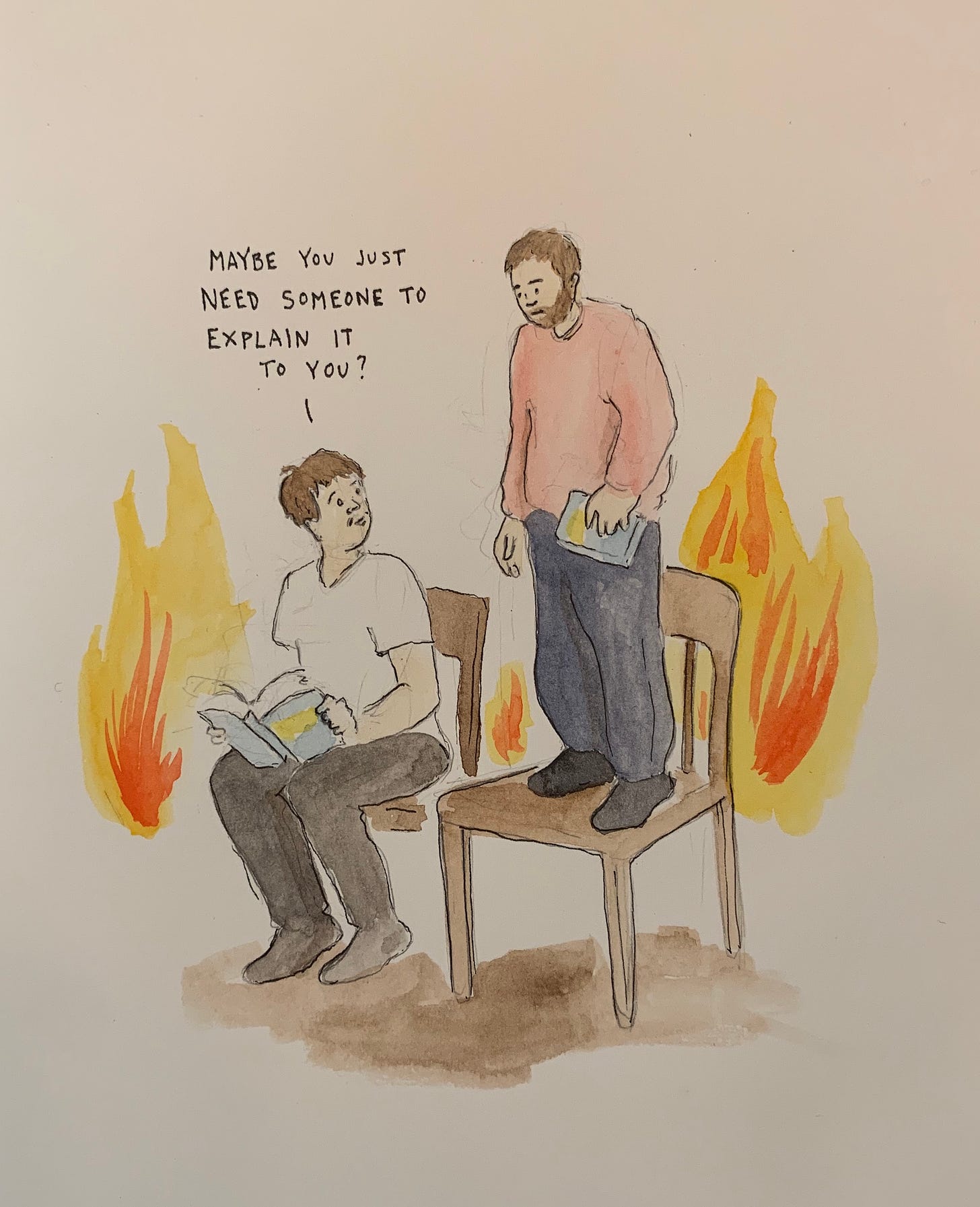
I found myself in an odd waiting room á la Beetlejuice. People filled long lines of chairs. The rows stretched far past where I could see. They sat in silence. Once I was in my chair, I craned my neck to see past the long line of heads in front of me. It was going to take literal years before I could see… whomever I was there to see. I noticed that everyone was reading the same book. I looked at my empty hands, and no sooner had I looked up than the receptionist appeared and asked if I’d like something to read while I waited. “Yes,” I said and she handed me my fat blue copy of David Foster Wallace’s Infinite Jest.
I began reading, and realized how long it had taken me to finish, how long it would take them all to finish. I stood up on my chair holding the book, and shouted “Stop. Everyone stop. Don’t you realize what’s happening? We’re in Hell!”
I woke up rasping the word “hell” in bed in the real world at 3:30 AM and wrote it all down.
This short bout with hypomania had positive effects, of course. It coincided with the first few weeks of spring in New York and I gained a deeper appreciation for how beautiful the Greenwood Cemetery is. I learned to hate New York City less. I also finished the last 300 pages of the dream book Infinite Jest and have retained most of its plot, enough to explain it to people who ask about it at the bookstore or in casual conversation. It’s about tennis, drugs, and a nightmarish movie.
Leaving depression behind is scary. Not sleeping and the inability to slow down thoughts is scarier. It would be simpler to let my old depressed self cover my brain and body like a weighted blanket. “Who will I be if I’m not a sad sack all the time?” I’d think. What’s astounding is that despite losing my sour mood to pills, therapy, better sleep, and long stretches of sobriety, the depth of how bad I felt is still there in my memory, like a sinkhole with an ever-thickening amount of concrete, dirt, and grass covering it, protecting me from falling in. Meditation and exercise cooled a crust around the roiling core of my brain and now I can function as your average adult idiot who isn’t sure he’s doing his taxes right every year.
When I peer down into the boarded-up well of sadness that I left uncovered so long, full of poisoned water since age 15 that I dumped alcohol and THC into hoping that would clear up the muck, I see my issue always was my expectations for my existence followed by the inevitable disappointments. I had visions of how fun everything would be, how successful I’d become, how effortlessly I’d get through school, how easy it would be to survive New York City in my 20s, how nicely I’d get along with anyone I dated. More and more clues presented themselves that I was not destined for fame, fortune, or effortless joy. Each negative moment took another Jenga block from the base of the emotional tower I’d built for myself, until around age 32, it all fell down. I realized most of my creative work made me feel worse, I always wanted to be doing something other than what I was currently doing, and whatever hobbies and vices I’d chosen to relieve this “grass is always greener/never in the moment” thinking was no replacement for answering the big question: what’s making me so sad and tired? I talked it out, read a few self-help books, and learned about myself enough to keep the sadness at bay.
Now, I think fondly about the romantic days of my youth when I was depressed and focused on nothing but fun and work and attempted to make them one and the same. I forced myself to feel good and when I didn’t, there was always another hangover and a bacon, egg, and cheese with which to smother the bad thoughts. I live in the suburbs now and wistfully think of my salad days in the city when I’d force fun onto myself the way a loud cocaine-addled guest at a boring dinner party might.
In my present daydreams, I picture myself crashing on a friend’s futon in Austin, Texas, drunk and snoring after playing music and performing comedy all night. I picture myself hustling from open mic to open mic, show to show, afterparty to afterparty, walking along Prospect Park as the Sun comes up. At night, I dream about people I haven’t seen in years and we’re talking out old spats under awnings that protect us from the rain, drinking pitchers of beer and eating oysters. We’re laughing in the dreams, wondering how we could have been so stupid for so long. Then I remember none of that was a dream. I lived those nights. I stayed at bars in Manhattan until they started putting chairs on the tables, I passed out in cabs, I woke up at 5 AM after a night of partying in one city to get on a plane to go to a wedding the same day at noon.
Now, I find myself getting excited about the new Black Keys album while on the way to buy more soil at Home Depot. I find myself genuinely thrilled about our tulips coming in. I fantasize that I’d like to stay out all night again— stay out like I used to, not knowing when I’d get home if at all. Then I think: if I lived like that again, when would I have the time to read or write? Where would I find the energy to jog? What if I can’t take my wife and dog with me on these endless trips and I get homesick? What if — God forbid — there’s nowhere to plug in my CPAP machine?
When I find myself swearing at my pond filters for not functioning properly, when I have to say no to a last-minute comedy show because I’m cooking dinner for a bunch of houseguests that night, when I think I’m leading a boring life, I take a breath and remember that the entire time I was depressed in my youth, I dreamt about being here.




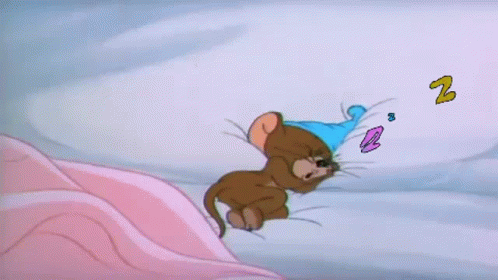
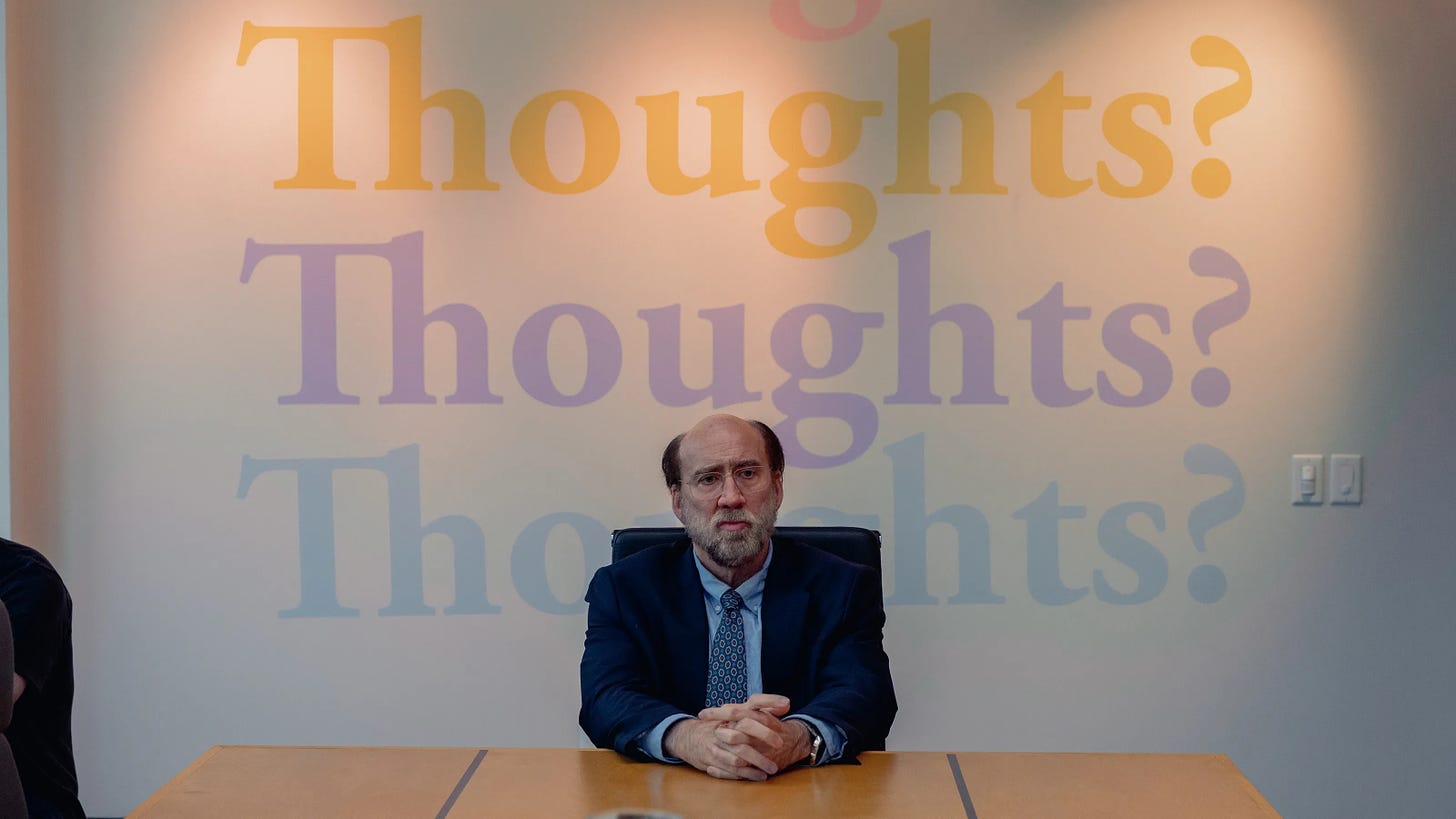
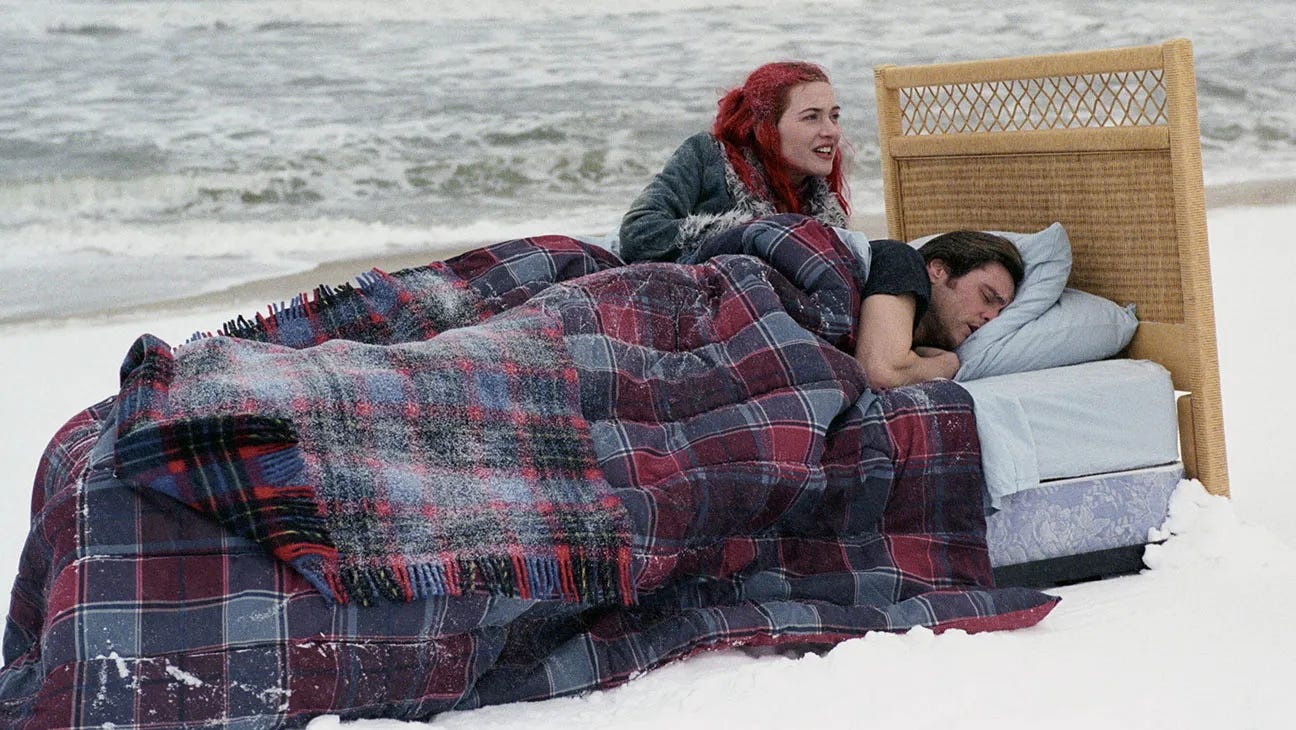
I think my husband has sleep apnea. He snores incredibly loudly, to the point where friends would no longer share hotel rooms with us even before we all had kids. I'm a deep sleeper and I go to bed before him, and I must just be used to it. I have listened to him seem to stop breathing for a minute at night. He, of course, has never brought it up to his doctor, and it was his new dentist that asked if he snored because something about the way his jaw is set and the pattern of wear on his teeth from grinding indicated it. I think he's afraid of having to get a CPAP so he doesn't tell his doctor anything and just hopes he'll wake up every morning. 😑
my husband had sleep apnea for a while. it was an issue but resolved with some lifestyle changes. i wish you the best of luck with it.